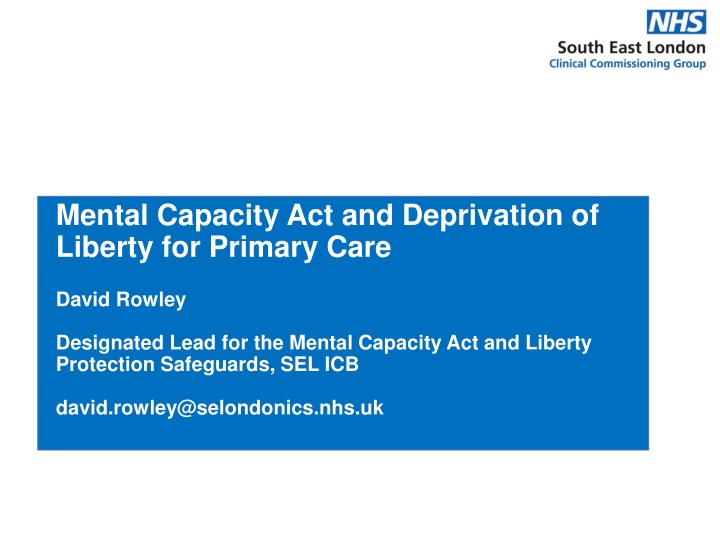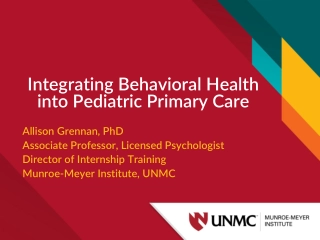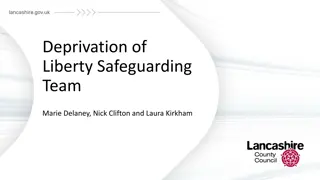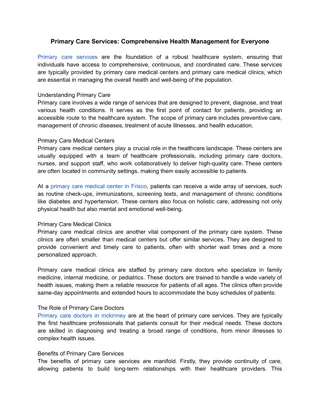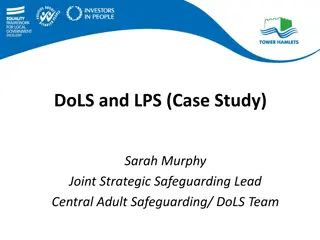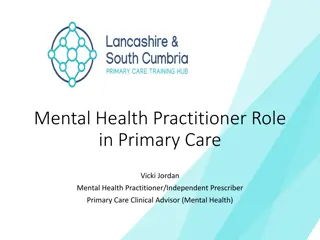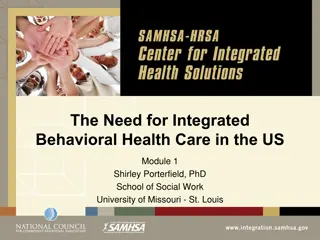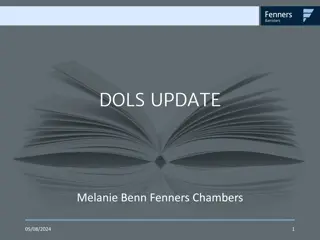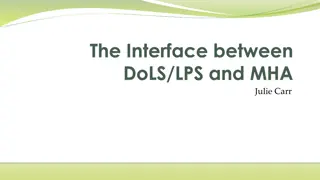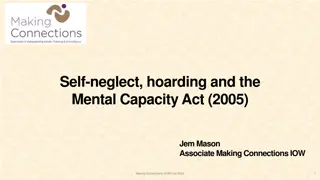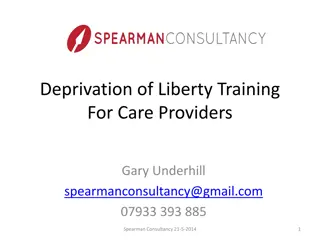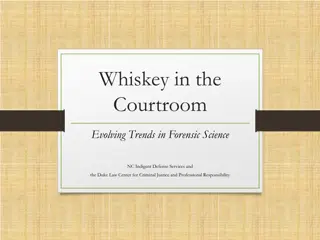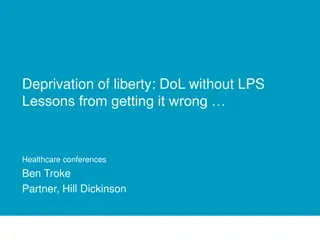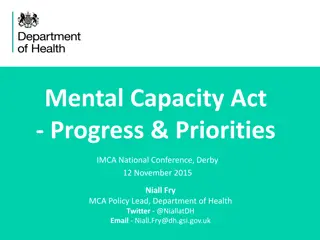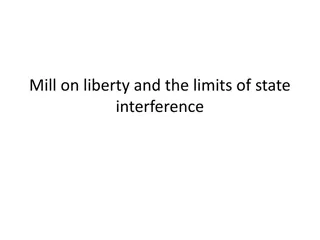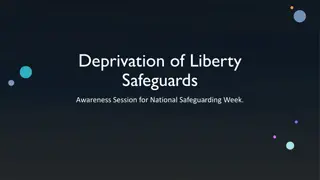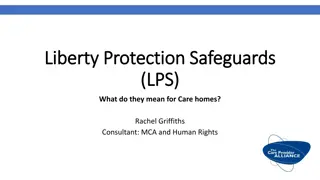Mental Capacity Act and Deprivation of Liberty for Primary Care
The Mental Capacity Act (MCA) safeguards individuals who may lack decision-making capacity, ensuring their rights are upheld. It outlines key principles, capacity assessments, best interests decisions, and what constitutes a deprivation of liberty. The Bournewood case exemplifies the importance of legal processes in safeguarding vulnerable individuals' liberty.
Download Presentation

Please find below an Image/Link to download the presentation.
The content on the website is provided AS IS for your information and personal use only. It may not be sold, licensed, or shared on other websites without obtaining consent from the author.If you encounter any issues during the download, it is possible that the publisher has removed the file from their server.
You are allowed to download the files provided on this website for personal or commercial use, subject to the condition that they are used lawfully. All files are the property of their respective owners.
The content on the website is provided AS IS for your information and personal use only. It may not be sold, licensed, or shared on other websites without obtaining consent from the author.
E N D
Presentation Transcript
Mental Capacity Act and Deprivation of Liberty for Primary Care David Rowley Designated Lead for the Mental Capacity Act and Liberty Protection Safeguards, SEL ICB david.rowley@selondonics.nhs.uk
What What is the Mental Capacity Act? is the Mental Capacity Act? The Mental Capacity Act (MCA) is designed to protect and empower people who may lack the mental capacity to make their own decisions about their care and treatment - NHS website Framework on decision making for people who may be unable to do so Article 8 HRA - Right to a Private and Family Life Underpinned by 5 principles Decisions are time and situation specific 2
Five Principles of the Mental Capacity Act Five Principles of the Mental Capacity Act 3
Capacity Assessments and Best Interests decisions Capacity Assessments and Best Interests decisions - -Top Tips Top Tips 1. 2. 3. 4. 5. 6. 7. Identify the decision. Who is the decision maker? Is the decision simple or more complex? Prepare! Give relevant information to the person. Assess capacity = have a structured conversation! If person lacks capacity, make a best interests decision Follow Best Interests checklist (key elements) Present wishes and feelings Previous wishes (an advance statement?) Views of others (family, professionals) Less restrictive option 8. Record What is the Mental Capacity Act | Lambeth Safeguarding Adults Board (lambethsab.org.uk 4
What is a Deprivation of Liberty? What is a Deprivation of Liberty? Article 5 of the Human Rights Act - Right to Liberty Right to Liberty is a qualified right A deprivation of liberty occurs when 1. Person lacks capacity (subjective element) 2. The person is under continuous supervision and control & not free to leave because of their care (objective element) 3. The state has involvement in/ is aware of the care (imputable to the state) A deprivation of liberty can only be authorised by due legal process 5
The The Bournewood Bournewood case case 49 year old autistic man, HL HL lived with Mr and Mrs E, under resettlement scheme from Bournewood Hospital Re-admitted to hospital in best interests under common law doctrine of necessity MHA not appropriate, HL lacked capacity No right of challenge to the clinician Following various court hearings ECHR decided HL Deprived of his Liberty. 6
Deprivation of Liberty Safeguards, COPDOL 11 Deprivation of Liberty Safeguards, COPDOL 11 DoLS is the due process to authorise a DoL DoLS is administered by local authorities only DoLS covers registered care homes and hospitals only Consists of three main assessments 1. Mental Disorder 2. Mental Capacity 3. Best Interests Deprivation of liberty can also apply in other settings In these cases, Court of Protection authorises directly An applicant would need to complete a COPDOL11 7
Issues and criticisms of the current system Issues and criticisms of the current system Process led rather than person centred rubber stamping exercise Doesn t meet the needs of the person New case law broadened definition of a DoL and therefore number of cases dramatically increased Local authorities unable to process applications Vulnerable people without appropriate protections In 2014, recognised that system not fit for purpose In 2015 Law Commission set about change 8
Liberty Protection Safeguards Liberty Protection Safeguards process overview process overview 3 Responsible Bodies , not just local authority CCG, Hospital Trusts, Local Authority (share the load!) 3 main assessments 1. Mental Disorder, 2. Mental Capacity and 3. Necessary and Proportionate (replaces best interests assessment) Duty to consult family New role of Approved Mental Capacity Professional Extends to 16-17 year olds IMCA if relevant Reviews more focused. After year 1, year 2 and three yearly thereafter 9
Liberty Protection Safeguards Liberty Protection Safeguards ethos overview ethos overview Ethos of LPS aims to incorporate consideration of liberty into mainstream care planning. Aims to discourage creation of separate processes/teams as per the current DoLS system How? By integrating assessments where possible into everyday practice/ transferability of assessments 10
Liberty Protection Safeguards Liberty Protection Safeguards an overview an overview LPS was due to come into force October 2020 Delayed due to Covid-19 Next date was set for April 2022 Further delay in 2021 as Code of Practice (CoP) was not finalised. No new date set at this stage Draft CoP has now been published and consulted upon (July 2022) We await final version of the CoP and implementation date. Likely to be in 2024 On commencement - there will be a 12 month transition period 11
Liberty Protection Safeguards Liberty Protection Safeguards SEL progress SEL progress Key challenges with implementation Collaborative working Integrating new responsibilities to front- line practice Developing skills in the new Responsible Bodies Training Developing IT Embedding a culture which protects liberty 12
Liberty Protection Safeguards Liberty Protection Safeguards SEL progress SEL progress What are SEL Responsible Bodies doing now to prepare for LPS? SEL ICS LPS Steering Group Borough LPS Groups BIA Training LPS Implementation Plan LPS Process Maps LPS Scoping 13
Liberty Protection Safeguards Liberty Protection Safeguards Protecting Liberty Protecting Liberty What can practitioners do now to prepare for LPS? The process has been delayed, but the ethos is relevant now! Effective MCA practice, support a person to make their own decisions. Effective care planning Adopt a strengths based approach, Promote conversations with the person Consider risks what level of intrusion is necessary? What is a proportionate level of support for the persons needs? 14
Liberty Protection Safeguards Liberty Protection Safeguards GP implications GP implications Likely ask for GP s Providing evidence of diagnosis of Mental Disorder Training needs: recognition of a DoL, action Capacity Assessments (possible but unlikely) Necessary and Proportionate Assessments (unlikely) No funds currently earmarked for this However, GP s have role (along with all of health staff) to support the ethos of LPS. Knowing and following the MCA principles Supporting rights and strengths based practice 15
